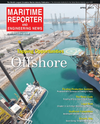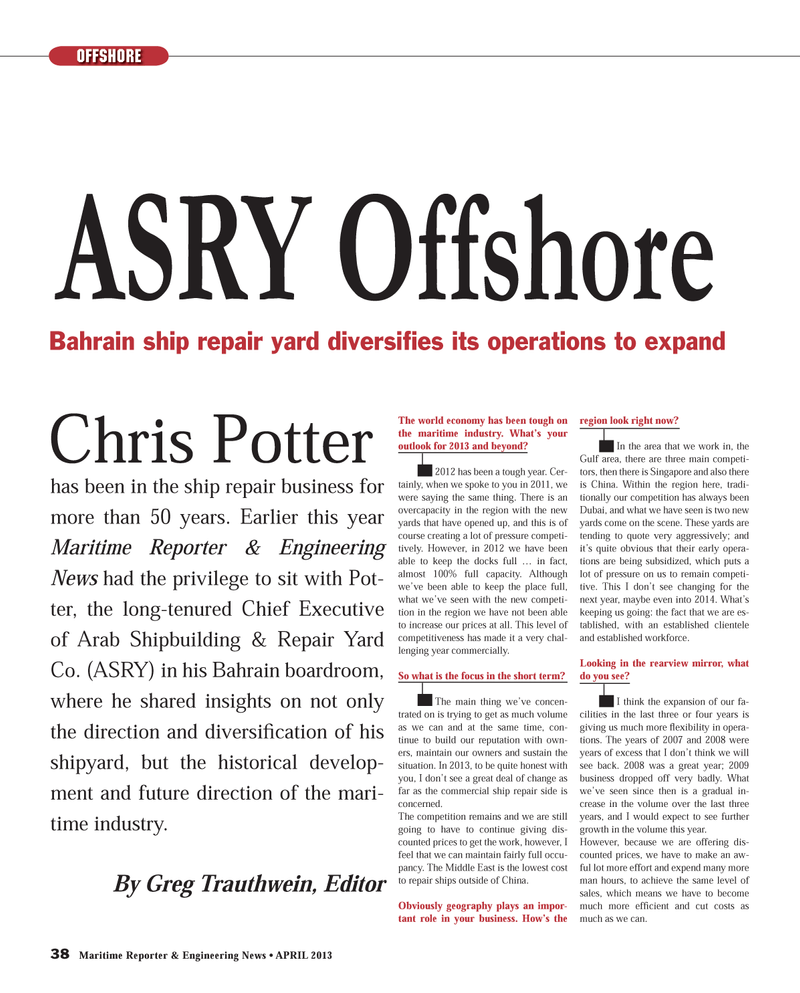
Page 38: of Maritime Reporter Magazine (April 2013)
Offshore Energy Edition
Read this page in Pdf, Flash or Html5 edition of April 2013 Maritime Reporter Magazine
38 Maritime Reporter & Engineering News ? APRIL 2013 The world economy has been tough on the maritime industry. What?s your outlook for 2013 and beyond? 2012 has been a tough year. Cer- tainly, when we spoke to you in 2011, we were saying the same thing. There is an overcapacity in the region with the new yards that have opened up, and this is of course creating a lot of pressure competi-tively. However, in 2012 we have been able to keep the docks full ? in fact, almost 100% full capacity. Although we?ve been able to keep the place full, what we?ve seen with the new competi-tion in the region we have not been able to increase our prices at all. This level of competitiveness has made it a very chal-lenging year commercially. So what is the focus in the short term? The main thing we?ve concen- trated on is trying to get as much volume as we can and at the same time, con-tinue to build our reputation with own-ers, maintain our owners and sustain the situation. In 2013, to be quite honest with you, I don?t see a great deal of change as far as the commercial ship repair side is concerned. The competition remains and we are still going to have to continue giving dis-counted prices to get the work, however, I feel that we can maintain fairly full occu-pancy. The Middle East is the lowest cost to repair ships outside of China.Obviously geography plays an impor- tant role in your business. How?s the region look right now? In the area that we work in, the Gulf area, there are three main competi-tors, then there is Singapore and also there is China. Within the region here, tradi- tionally our competition has always been Dubai, and what we have seen is two new yards come on the scene. These yards are tending to quote very aggressively; and it?s quite obvious that their early opera- tions are being subsidized, which puts a lot of pressure on us to remain competi-tive. This I don?t see changing for the next year, maybe even into 2014. What?s keeping us going: the fact that we are es-tablished, with an established clientele and established workforce. Looking in the rearview mirror, what do you see? I think the expansion of our fa- cilities in the last three or four years is giving us much more ß exibility in opera-tions. The years of 2007 and 2008 were years of excess that I don?t think we will see back. 2008 was a great year; 2009 business dropped off very badly. What we?ve seen since then is a gradual in-crease in the volume over the last three years, and I would expect to see further growth in the volume this year. However, because we are offering dis- counted prices, we have to make an aw-ful lot more effort and expend many more man hours, to achieve the same level of sales, which means we have to become much more efÞ cient and cut costs as much as we can. OFFSHOREASRY Offshore Bahrain ship repair yard diversiÞ es its operations to expand Chris Potter has been in the ship repair business for more than 50 years. Earlier this year Maritime Reporter & Engineering News had the privilege to sit with Pot-ter, the long-tenured Chief Executive of Arab Shipbuilding & Repair Yard Co. (ASRY) in his Bahrain boardroom, where he shared insights on not only the direction and diversiÞ cation of his shipyard, but the historical develop-ment and future direction of the mari-time industry. By Greg Trauthwein, Editor MR #4 (34-41).indd 38MR #4 (34-41).indd 384/2/2013 4:01:48 PM4/2/2013 4:01:48 PM

 37
37

 39
39
